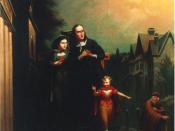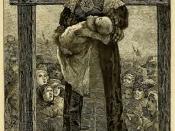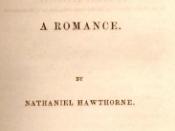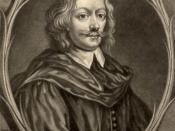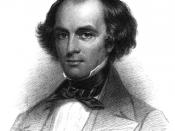"It is necessary only for the good man to do nothing for evil to triumph." These are the wise words of the lawyer, writer and politician Edmund Burke. Burke's quotation anticipates that, a sinister person may subjugate a virtuous soul simply by the ignorance of the noble individual. Edmund Burke's quotation is pertinent to two main characters in Nathaniel Hawthorne's famous novel, The Scarlet Letter: Arthur Dimmesdale and Roger Chillingworth. Arthur Dimmesdale represents the virtuous soul and Roger Chillingworth represents the sinister man. The frail, Puritan minister, Arthur Dimmesdale, wins the battle against iniquity, while the fiendish physician, Roger Chillingworth, attempts to prevail by inflicting distress in him through psychological strain, seeking revenge.
Roger Chillingworth, the diabolical physician, is obsessed with seeking revenge on Reverend Arthur Dimmesdale, the Puritan minister who slept with and fathered the child of Hester Prynne, Chillingworth's wife. Because Dimmesdale's health begins to fail, the townspeople agree to have Chillingworth move in with and watch over him.
The townspeople are so concerned of Dimmesdale's health because they are in awe of his righteousness and holiness. Hawthorne writes, "The young divine, whose scholar-like renown still lived in Oxford, was considered by his more fervent admirers as little less than a heaven-ordained apostle, destined, should he live and labor for the ordinary term of life..." (82). Chillingworth begins to suspect that the minister's illness is the result of an unconfessed sin. He applies psychological strain on Dimmesdale because he suspects him to be Hester's secret lover. Dimmesdale's soul is obviously in Chillingworth's hands.
Hawthorne acknowledges, "This diabolical agent had the Divine permission, for a season, to burrow into the clergyman's intimacy, and plot against his soul/He became, thenceforth, not a spectator only, but a chief actor, in the poor minister's interior world" (88, 96).
Dimmesdale's agonized suffering by Chillingworth's torment is the direct result of his inability to confess his sin that, he is Pearl's father. At the end of Chapter 9, "The Leech," Hawthorne writes, "Alas, to judge from the gloom and terror in the depths of the poor minister's eyes, the battle was a sore one, and the victory any thing but secure!" (88).
This is where the battle between good and evil begins; however, Dimmesdale cannot fight back because he is unaware of Chillingworth's adding distress to his soul through psychological pressure.
Dimmesdale's suffering becomes so intense, his body grows weaker and his popularity among the townspeople becomes greater. The congregations adoration added to his torment. He begins beating himself as self-punishment because he incapable of confessing his sin. Hester Prynne, Dimmesdale's secret lover, sees how much he's changed and tells him that her husband, Roger Chillingworth, is inflicting all the distress in him. Hawthorne writes, "Roger Chillingworth knows your purpose to reveal his true character. Will he continue then, to keep our secret? What will now be the course of his revenge?" (134). Now that Dimmesdale knows his tormentor's true identity, Roger Chillingworth and Hester's husband, he fears him; however, Dimmesdale can now overthrow the sinister physician, by not allowing him to continue the torture.
Dimmesdale's plans to leave to Europe with Hester and Pearl after his Election Day sermon are ruined when Hester is told that, Chillingworth will be accompanying them on the trip. Chillingworth will not let Dimmesdale escape from punishment. After his Election Day sermon, Dimmesdale turns to the scaffold and Chillingworth grabs him by the arm attempting to stop him. Hawthorne emphasizes, "At this instant old Roger Chillingworth thrust himself throughout the crowd ... to snatch back his victim from what he sought to do!" (172). Dimmesdale confesses his sin and Chillingworth is enraged.
Chillingworth exclaims, "Thou hast escaped me" (175). Dimmesdales then says, "May God forgive thee" (175). The weak minister, Arthur Dimmesdale, finally had the courage to confess his sin publicly: winning the battle against the sinister physician, Roger Chillingworth.
Throughout The Scarlet Letter Dimmesdale allows Chillingworth to anguish him because he is unaware of the physician's true identity and he thinks its just part of his therapy. When he obtains the knowledge of that, Chillingworth's true identity is Hester's husband and his tormentor, he is able to fight back and win the battle at the end of the novel. Chillingworth loses his victory in three ways: he can no longer torment Dimmesdale, he receives Dimmesdale's blessing and his sin of violating Dimmesdale heart and soul is let out to the public. The sinister Chillingworth had success throughout the entire novel, but it is the last battle that counts and Dimmesdale prevails.
